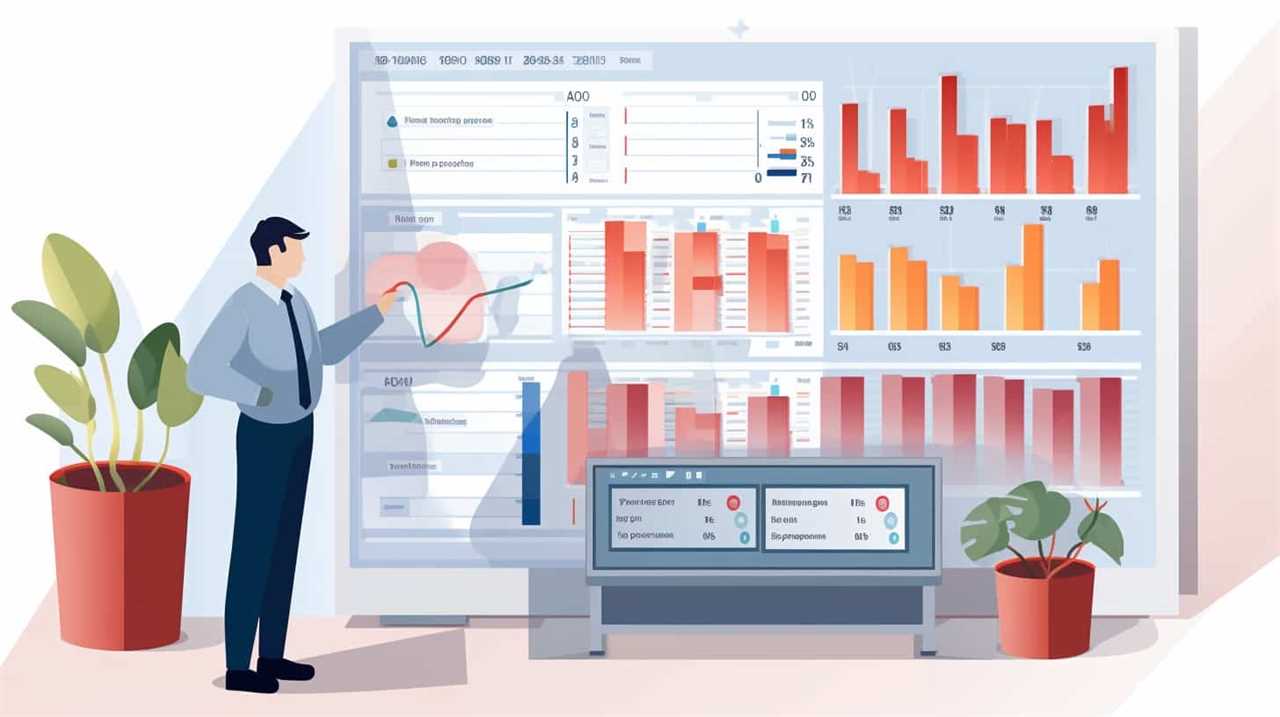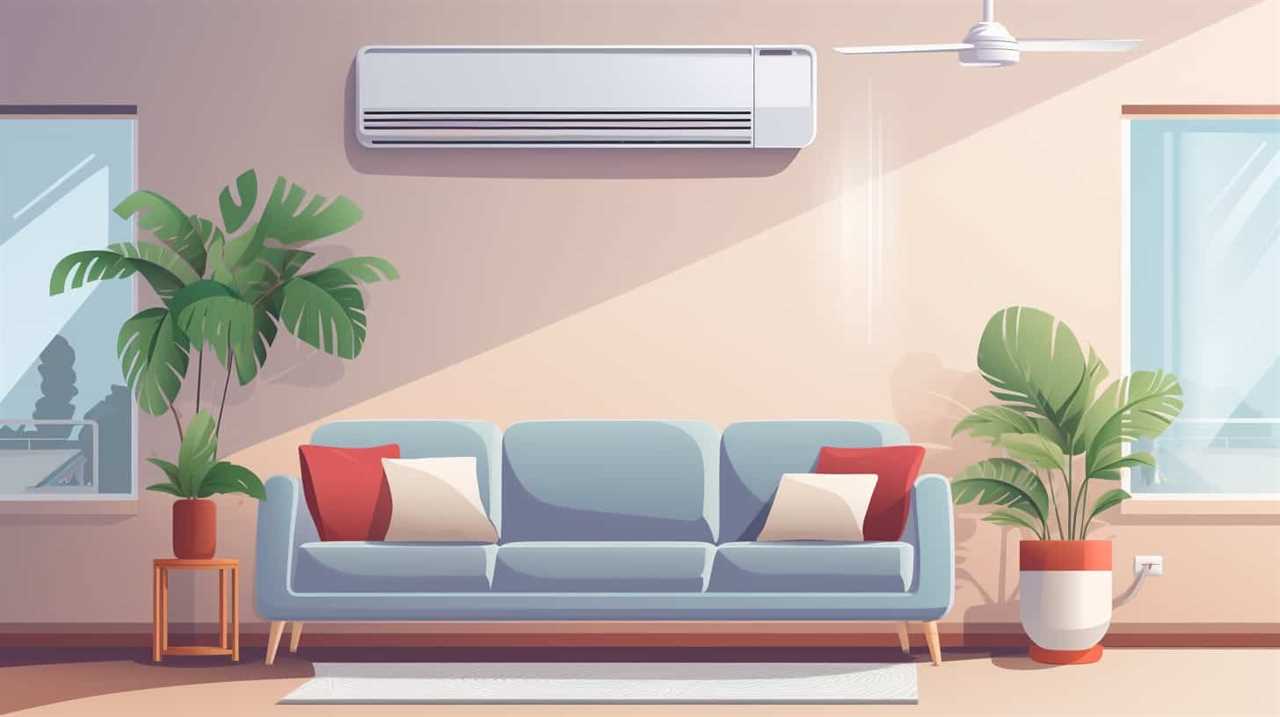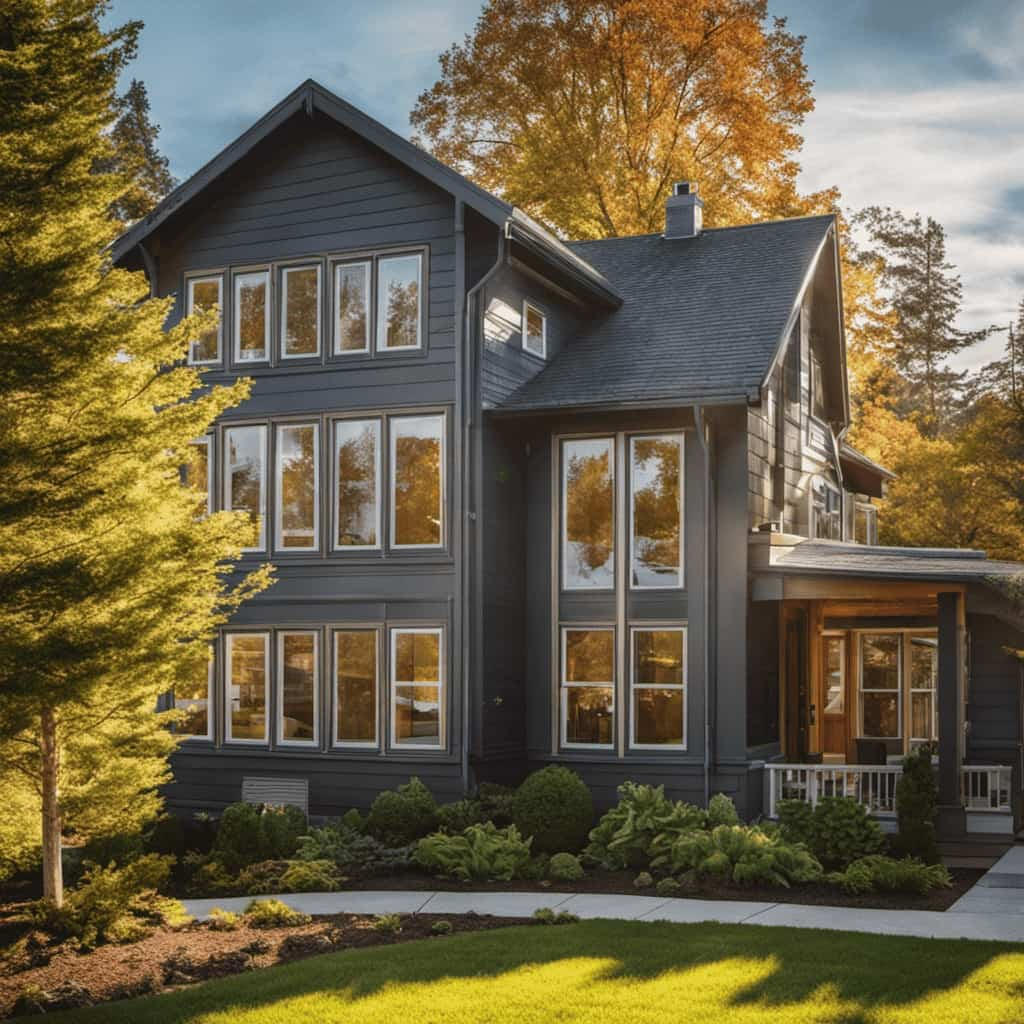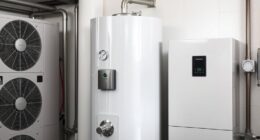We have all the information on energy-efficient heat pumps for environmentally friendly homes. These sustainable systems are top-notch when it comes to heating and cooling while also benefiting the planet.
In this article, we’ll break down how these pumps work, what to consider when choosing one, and the different types available. Plus, we’ll share tips on maximizing energy savings through proper maintenance.
Get ready to dive into the world of eco-friendly heating and cooling!
Key Takeaways
- Energy-efficient insulation materials and renewable energy sources are important for creating eco-friendly and cost-effective green homes.
- Heat pumps utilize heat transfer to provide sustainable heating and cooling while minimizing environmental impact.
- When choosing an energy-efficient heat pump, consider factors such as SEER and HSPF ratings, variable speed compressors, dual fuel capability, and environmentally friendly refrigerants.
- Different types of heat pumps, such as air source, ground source, and water source, have different applications based on climate, available space, and budget.
The Importance of Energy Efficiency in Green Homes
We believe that maximizing energy efficiency should be a top priority in our green homes. One way to achieve this is through energy-efficient insulation. By using insulation materials that have a high R-value, such as cellulose or spray foam, we can reduce heat loss and minimize the need for heating or cooling. This not only helps to lower energy consumption but also creates a comfortable living environment.

Additionally, incorporating renewable energy sources in energy-efficient homes can further enhance their sustainability. Solar panels, for example, can harness the power of the sun to generate electricity, reducing our reliance on fossil fuels. By prioritizing energy efficiency and utilizing renewable energy sources, we can create homes that are both eco-friendly and cost-effective.
Transitioning to the next section, let’s now explore how heat pumps work for sustainable heating and cooling.
How Heat Pumps Work for Sustainable Heating and Cooling
To understand how heat pumps work for sustainable heating and cooling, it’s important to grasp the process of heat transfer and the role of refrigerant in this system.
Heat pump technology utilizes the principle of heat transfer to extract heat from the environment and transfer it into a building for heating or remove heat from the building for cooling. This process is achieved by circulating a refrigerant, which absorbs heat when it evaporates and releases heat when it condenses. The refrigerant acts as the medium that facilitates the transfer of heat.

By utilizing this process, heat pumps can provide efficient heating and cooling while minimizing their environmental impact.
Now that we understand the basics of how heat pumps work, let’s explore the key factors to consider when choosing an energy-efficient heat pump.
Key Factors to Consider When Choosing an Energy-Efficient Heat Pump
Considering the efficiency, cost, and environmental impact are key factors when choosing an energy-efficient heat pump. To ensure you make the right decision, here are some important criteria and energy-saving features to consider:
-
Seasonal Energy Efficiency Ratio (SEER): Look for a heat pump with a high SEER rating, as it indicates better energy efficiency.

-
Heating Seasonal Performance Factor (HSPF): Higher HSPF ratings translate to more efficient heating performance.
-
Variable Speed Compressor: This feature allows the heat pump to adjust its speed according to the heating or cooling needs, resulting in better energy savings.
-
Dual Fuel Capability: Opt for a heat pump that can switch between electric and gas heating, allowing you to choose the most cost-effective option.
-
Refrigerant Type: Consider heat pumps that use environmentally friendly refrigerants with low global warming potential.

Understanding the Different Types of Heat Pumps for Green Homes
As we delve into the topic of understanding the different types of heat pumps for green homes, it is important to note that there are several options available to homeowners. Heat pumps are a popular choice for heating and cooling homes efficiently while minimizing environmental impact. Let’s take a closer look at the different types of heat pumps commonly used in green homes:
| Type | Description | Benefits |
|---|---|---|
| Air Source | Transfers heat between the indoor air and outdoor air | Cost-effective, easy installation, suitable for moderate climates |
| Ground Source | Utilizes the stable temperature of the ground to heat and cool homes | Highly efficient, long lifespan, consistent performance |
| Water Source | Extracts heat from water bodies, such as lakes or wells | High efficiency, versatile applications, reliable performance |
Choosing the right type of heat pump for your green home depends on factors such as climate, available space, and budget. Additionally, it’s worth exploring heat pump installation rebates and incentives offered by local and federal governments to make your investment more affordable.
Maximizing Energy Savings With Proper Heat Pump Maintenance
By regularly performing proper heat pump maintenance, we can maximize energy savings in our green homes. Maintaining our heat pumps not only ensures their efficiency but also reduces our carbon footprint. Here are some heat pump maintenance tips and energy-saving practices to help us achieve optimal performance and energy efficiency:
- Clean or replace air filters regularly to improve airflow and reduce energy consumption.
- Keep the outdoor unit free from debris, such as leaves and branches, to maintain proper airflow.
- Schedule professional maintenance annually to check for refrigerant leaks, clean coils, and optimize system performance.
- Insulate the air ducts to minimize heat loss during the distribution process.
- Use a programmable thermostat to set temperature schedules and avoid unnecessary energy consumption.
Frequently Asked Questions
Can Heat Pumps Be Used to Heat Water in Addition to Providing Heating and Cooling for the Home?
Yes, heat pumps can be used for heating water as well as providing heating and cooling for the home. Using heat pumps for swimming pools and water heating offers numerous benefits, such as energy efficiency and reduced greenhouse gas emissions.

Are There Any Government Incentives or Rebates Available for Installing Energy-Efficient Heat Pumps in Green Homes?
Yes, there are government incentives, rebates, and tax credits available for installing energy-efficient heat pumps in green homes. These financial assistance programs aim to promote the use of energy-efficient technologies and reduce carbon emissions.
What Is the Average Lifespan of an Energy-Efficient Heat Pump?
The average lifespan of an energy-efficient heat pump is typically around 15 to 20 years. Regular maintenance tasks, such as cleaning and replacing filters, can help prolong its lifespan and ensure optimal performance.
Are There Any Specific Maintenance Tasks That Homeowners Can Do Themselves to Ensure the Optimal Performance of Their Heat Pump?
To ensure optimal performance of your heat pump, there are self-maintenance tips and troubleshooting techniques you can follow. Regularly cleaning or replacing air filters, checking refrigerant levels, and inspecting outdoor units are essential tasks.
How Does the Cost of Operating an Energy-Efficient Heat Pump Compare to Traditional Heating and Cooling Systems?
Operating costs comparison between energy-efficient heat pumps and traditional heating and cooling systems reveal significant energy savings. Our research shows that these green alternatives are not only eco-friendly but also cost-effective in the long run.

Conclusion
In conclusion, energy-efficient heat pumps are a vital component of green homes, providing sustainable heating and cooling. By understanding how they work and considering key factors when choosing a heat pump, homeowners can maximize energy savings.
Regular maintenance is also essential to ensure optimal performance and longevity. Just imagine a green home with a heat pump silently working, seamlessly providing comfort while minimizing environmental impact.
It’s a vision of a sustainable future that we can all strive for.









